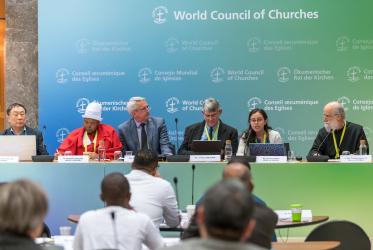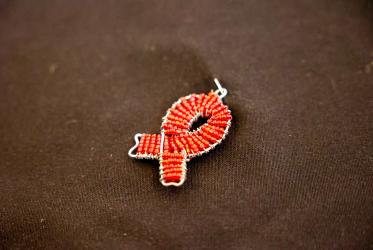CWM Assembly statement
Ayr, Scotland, 15 - 25 June 2003
1. Preamble
The inaugural Assembly of the Council for World Mission (CWM), bringing together 150 delegates from the 31 member churches, met in Ayr, Scotland from 15 to 25 June 2003. The family of CWM churches, from 6 global regions, gathered to celebrate its diversity, to affirm its unity in Christ, to share news and experiences about mission, to reflect upon major world events and to explore together their implications for mission action today.
Hosted by the Congregational Federation, one of CWM's member churches in the United Kingdom, the Assembly delegates were exposed to certain contemporary mission challenges within the European context. The steady decline in church membership, disillusionment with the institutional church amongst young people especially, and a culture of secularization are just some of the major mission issues faced by churches in this region. Yet in sharing our stories and experiences from across all 6 CWM regions, we discovered that our problems and challenges are often similar. Therefore as we reflected, shared and studied together, we came to a fresh realization of the need to journey together as a people of God, to increase our common pool of material and spiritual resources and to continue building up the Body of Christ through CWM for the sake of ministry and mission in the world.
In his General Secretary's address, Dr Des van der Water declared: "Our Assembly gathering represents a particular moment in CWM history - awaiting the in-pouring of the new wine." In similar vein outgoing moderator Dr Huang Po Ho noted: "We are standing in a transition moment of history, in which CWM needs to redefine what it understands by the concept of neighbourhood." Following his election as moderator, Dr Roderick Hewitt observed: "I believe CWM is poised, amid the tumult of the world, to be a sign of justice in relationships".
2. Process
In worship, bible study and mission-issue discussion groups, delegates wrestled the question posed by our Assembly theme, namely: "Who is my neighbour?"
This theme gave a focus to our discussions about the challenges posed by the major new mission frontier issues today. For example, we are faced with the ever-growing HIV/AIDS pandemic; the sudden outbreak of the Severe Acute Respiratory Syndrome; bourgeoning multi-faith, multi-cultural and multi-ethnic communities; the exploitation and abuse of God's creation; social and economic injustices in societies; the resort to war and violence as a means to settling disputes, differences and conflicts; the break-down of family life and the ongoing marginalization of women and youth.
In our reflections we realized again the importance of discerning the mind of Christ and being more responsive to what God is doing in the world to bring about healing, wholeness and salvation. We concurred that innovative, creative and more effective forms of evangelization must to be explored; and that new and relevant ways of being church were to be pursued.
Our awareness of human rights crises with which some of our member churches are struggling in their countries, and which have worsened the serious economic plight in their communities, made a strong and urgent claim upon our prayerful and practical expressions of solidarity.
We have reflected on the theological basis of our mission mandate, seeking Spirit-led strategies to tackle the global issues which demand, not just belief, but faith-in-action. We have sought to understand what actions Christ-like compassion demands today.
In the face of accelerating degradation and abuse of the environment, we assert the Christian values of hospitality, sufficiency, justice, love and peace, all rooted in respect for God's creation, can change the humankind's attitude to nature.
We recognize the need to become more caring, welcoming and healing communities that no longer stigmatize, exclude and discriminate against our brothers and sisters living with HIV/AIDS. We acknowledge the value of personal encounters with people infected and living with HIV/AIDS to enrich our understanding, and strengthen our ability to be professionally competent, spiritually sound and socially relevant in dealing with the human dimensions of the pandemic.
In our striving to be a sign and a witness to the kingdom of God, authentic discipleship means that congregations need to work consciously and intentionally towards becoming multi-cultural. This will mean more than simply accepting and tolerating, requiring a genuine recognition of 'the other' as being made in the image of God. Likewise, we recognize that inter-faith dialogue is a journey of heart-to-heart encounter and a sharing of experiences that incorporate us, in openness and honesty, to pursue a fairer and more just world together.
The challenges of economic injustice and exploitation, which are experienced at local, regional and global levels, also compel us to act more strongly in favour of poor, deprived and disadvantaged communities.
3. Declaration
As a people of God, we in CWM affirm that our reason for being is, as outlined in our founding principle, to spread the knowledge of Christ in word and deed'. Therefore, at this inaugural Assembly in the year of our Lord 2003, we commit ourselves anew to being servants within God's who, in humility, equality and mutuality seek to enable and empower all our people for mission.
As we have reflected on our journey together thus far, we realize that, although we can claim to stand on the peaks of the past, we are still only in the foothills of the future.
The Assembly therefore calls upon the CWM globally, regionally and nationally, for the next 3 years, to embrace the Assembly theme, Who is my neighbour?' and to answer this question through the witness of our planning, projects and programmes in mission.
The Assembly therefore challenges CWM to:
-
consistently keep the issues presented by women and youth high on our agendas in our common bid to give full recognition to all members that constitute the Body of Christ
-
redouble its efforts and intentions to spiritual and material resources that will enable the churches to be transformed and to become welcoming faith-communities and places that sow the seeds of reconciliation
-
initiate education in mission programmes and creating training materials in leadership for mission that will equip church leaders and members to work with individuals, faith communities and secular organizations which share our values and visions for justice and peace and the integrity of creation
-
facilitate mission workshops and events in which representatives of member churches can share stories and experiences, and devise strategies that will empower the churches, and disadvantaged individuals in the societies in which they work, to gain access to fundamental human and civil rights such as education, health, housing and employment opportunities
-
encourage member churches to incorporate modules into their theological education programmes that will equip both ordained and lay people training for ministry in such areas as:
- innovative and relevant ways of being church
- new and creative forms of evangelism
- ministry with and to children
- gender, economic, cultural, and environmental justice
- relating to other faiths
- responding to HIV/AIDS and other health-crisis challenges
- resolution of conflict and peace-building
In the concluding paragraph of his address to Assembly, the General Secretary reminded us of Isaiah 43: "Do not dwell on the past. See, I am doing a new thing!" and commissioned us with the words: "We have positioned and primed ourselves as CWM for the next stage of our journey as the people of God. We have been born out of mission, transformed in mission, and will be sustained for mission, to the glory of God."
We commit ourselves anew to our mission for God in the world. Our quest to be neighbour to all who are in need will be aided and strengthened through the promised gift of Christ's Holy Spirit.





